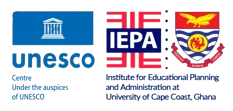A Dutch government funded project - Leadership and Management Capacity Building for Ghanaian Polytechnics (2005-2010) in partnership with Vrije University, Amsterdam.
This project involved conducting research on the capacity development needs of middle managers in the ten polytechnics in Ghana. IEPA in collaboration with the Vrije University and University of Twente (both in the Netherlands), undertook a leadership and management capacity learning needs of Top and Middle-level managers of all ten polytechnics in Ghana.
Over a period of five (5) years (2004-2009), the tertiary education leadership and management capacity of ten (10) Principals, ten (10) Vice-Principals, ten (10) Registrars, thirty (30) Assistant Registrars and fifty (50) Deans of Faculty were built. A major impact of the training was that the Principals were able to cope with challenges associated with the transition of the polytechnics from secondary to tertiary status.
To sustain the project, institutional level change management agents were trained to integrate key competences emerging from the five-year engagement into each polytechnic's management system. One key outcome of the project is the publication of a book titled: 'Trends in Polytechnic Education in Ghana.
EdQual project on implementing Education Quality in Low-Income Countries.
IEPA participated in an EdQual project on implementing Education Quality in Low Income Countries (2006-2011). EdQual was a five-year research programme consortium funded by the UK Department for International Development (DfID). The collaborating partners were University of Bristol, and Universities of Bath (UK), the Witwatersrand, Johannesburg (SA), Cape Coast (Ghana), Dar es Salaam (Tanzania), Kigali Institute of Education (Rwanda), Aga Khan University (Pakistan) and the Universidad de La Frontera (Chile).
The IEPA coordinated the Leadership and Management, and the Language and Literacy components of the programme in Ghana. In addition, the IEPA trained and supported twenty (20) headteachers to adopt participatory action research (PAR) techniques to identify and address issues that directly impacted education quality for disadvantaged pupils in their schools. A major competency gap identified by the EdQual project was the lack of headteachers’ capacity to provide leadership for learning in schools in Ghana and Tanzania.
Leadership for Learning(LfL).
Based on the findings from the EdQual project, the IEPA submitted a proposal to the Centre for Commonwealth Education, University of Cambridge. This culminated in a collaborative project between IEPA and the Centre for Commonwealth Education, dubbed “Leadership for Learning” (LfL). The project, funded by Commonwealth Education Trust, used research outcomes to improve students’ learning through enhanced leadership for learning capacity of headteachers. It also provided evidence for policymakers and practitioners about a country-wide approach to developing school leadership for learning. The impact of the LfL project included:
- LfL principles adopted and incorporated into the Headteachers' Handbook by the Ghana Education Service (GES), and used as the basis for headteacher professional development.
- A cohort of one hundred and twenty-four (124) leading-edge headteachers and their circuit supervisors from all ten (10) regions of Ghana fully involved in research and development.
- All the two hundred and sixteen (216) District Education Training Officers trained to support LFL training activities in their districts.
- After training trainers from the Teacher Education Division of Ghana Education Service (GES), they have in turn trained over 5,000 school leaders, with technical support from IEPA.
Transforming Teacher Education and Learning (T-TEL).
The leadership capacity-building component of the Government of Ghana’s flagship reform programme in teacher education dubbed Transforming Teacher Education and Learning (T-TEL) was led by IEPA. The IEPA provided direct training for 252 leaders from 42 public Colleges of Education over a 3-year period (October, 2015 to August, 2018) in key leadership areas, namely: Setting New Directions for the Colleges; Systems leadership, Operations leadership, Curriculum leadership, Change management and Strategic leadership. In addition, IEPA wrote leadership training manuals and resource materials for the Colleges. Senior Academic Members of IEPA were also assigned as College Improvement Advisors (CIAs) to all the forty-two (42) Colleges and they provided on-site coaching support to the leaders on college improvement and development planning. The major impacts are that college leaders have:
- Developed the capacity to conduct college self-assessment and develop college improvement plans.
- Acquired the skills for developing college policies.
- Acquired the skills to develop college roadmaps to guide the progress towards institutional autonomy.
- Become gender-responsive in their roles.
Education 2030 Agenda.
The IEPA has organised sensitisation workshops for stakeholders in education on the Education 2030 Agenda in collaboration with the Ghana National Commission for UNESCO for the Brong Ahafo, Ashanti and Central Regions of Ghana in 2018. In all, one hundred and forty-eight (148) key stakeholders from the three regions took part in the sensitisation workshop on the 8th, 9th and 12th March 2018 respectively. The 148 participants developed action plans for further dissemination of the Education Agenda 2030 at the community level.
Global Citizenship Education for Educators (GCED).
The IEPA hosted a three- day capacity-building workshop on Global Citizenship Education for Educators’ (GCED) in collaboration with Ghana National Commission for UNESCO (NATCOM), Ministry of Education, the Asia-Pacific Centre of Education for International Understanding (APCEIU) and the National Commission for Civic Education (NCCE) from 17th – 19th September 2018. The workshop was aimed at building the capacity of Ghanaian Educators towards the concept of Global Citizenship Education, as elaborated in Sustainable Development Goals (SDG) 4.7.1. It further sought to provide a platform for knowledge acquisition and skills for sustainable development. Key issues addressed at the workshop included Emergence of the Global Citizenship Education, Education Towards the Culture of Peace and Conflict Resolution and Prevention of Violent Extremism, and Education for Sustainable Development: Creating the Critical Global Educator for a Global Competent Citizenry. The participants (70) were drawn from regional representatives from NCCE, staff of IEPA and UNESCO Clubs throughout Ghana. The participants at the end of the workshop prepared an action plan to pursue citizenship education in their various institutions.

